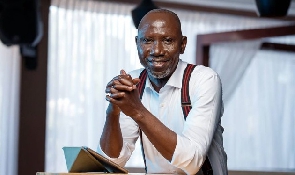Yesterday, I streamed live the “Business in Deep Waters” episode which took place at the ICGC New Wine Temple in East Legon, led by the Ocrans, where I listened to Uncle Ebo Whyte answer a lady's question:
"When can you know if you are wasting time or if you need patience to stay in a situation?" Though the ambiance and the by-the-fire-side sitting arrangement caught my eye, this question stuck with me.
Thinking that Uncle Ebo Whyte, the storyteller, might turn to motivational sources for an answer, quoting books by Steven Covey or Tony Robbins, he did no such thing. Instead, he turned to God. He simply said, “Wait for God.” This response might sound like a cliché, like the generic "God did it" answer often given by Christians.
But Uncle Ebo's response was not a mere Christian saying. He was offering a profound piece of advice by stressing the importance of hearing from God before making a significant move in life.
Uncle Ebo then shared a true story about a man who, despite being passed over for promotion, remained loyal to his company. His colleagues ridiculed him for his lack of ambition, questioning why he didn't pursue better opportunities elsewhere.
His response was simple and unwavering: "God asked me to stay."
Years later, after consistently demonstrating his value, the man was offered an exceptional position that came with a new home, a car of his choice, and a salary far exceeding anything he could have imagined. This offer elevated him above even his former superiors. Uncle Ebo concluded the story by saying, "This is how our God works."
It is very clear from Uncle Ebo’s story that to hear God by waiting on Him is the best decision any Christian can make. And to see how our God works, we must learn to hear and obey Him.
To wait for God, we must hear God, and to hear God, we must wait for God. Uncle Ebo's advice, "Wait for God," implies that one should hear God before making a decision, not after. As written, “in the beginning, God…” meaning God should be at the beginning of all our major decisions (career, marriage, emigration etc.).
But how many of us can truly claim to hear God's voice on critical matters? A friend of mine shared a story about how he inquired with his girlfriend, who was about to get married to another man, whether she had heard from God regarding her decision. Her response shocked him: "I have prayed and prayed but haven't heard anything, so I'm going ahead anyway."
I wondered why my friend was surprised by her response, considering many Christians often rush into decisions without waiting for God. This highlights the prevalence of worldly decision-making in the church, where God is often sidelined.
I then examined my decisions against Uncle Ebo's advice and realized that I, like many others, fall short. In the absence of God’s voice, many of us end up playing "chacha” with our lives.
Why is this so? Waiting for God is hard. It requires waiting for someone you cannot see and for an unknown duration. Also, in our fast-paced world, where decisions are made at the speed of light, waiting for God can seem counterintuitive.
Yet, it is essential for Christian success. We need God's guidance to make informed decisions that align with His plan for our lives. Hearing Him empowers our decisions, ideas, and thoughts. This makes Uncle Ebo's advice our most strategic pursuit after salvation.
While some may point to successful individuals who don't claim to know or wait on God, we must remember that success has different definitions. As Christians, we operate under a different set of rules, guided by faith and God's plan. We adhere to biblical principles, just as Buddhists, Muslims, traditionalists, or even atheists follow their own beliefs and guidelines.
So then, Uncle Ebo’s answer that the lady should wait for God is not merely a cliché or a shallow answer to human dilemma. It's a crucial step towards achieving one’s purpose in life.
Opinions of Saturday, 25 November 2023
Columnist: Lenny Kuuku Simmons















